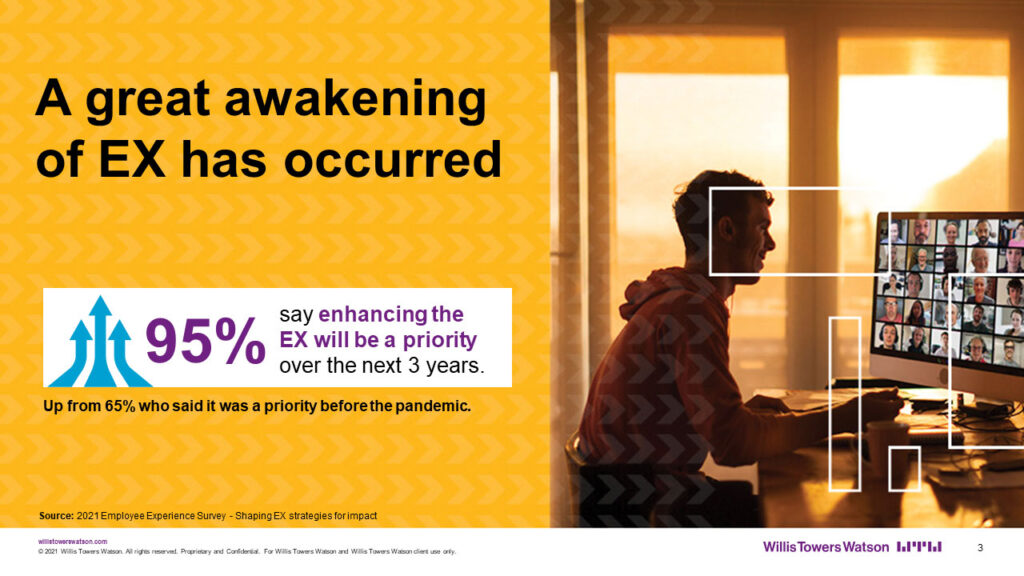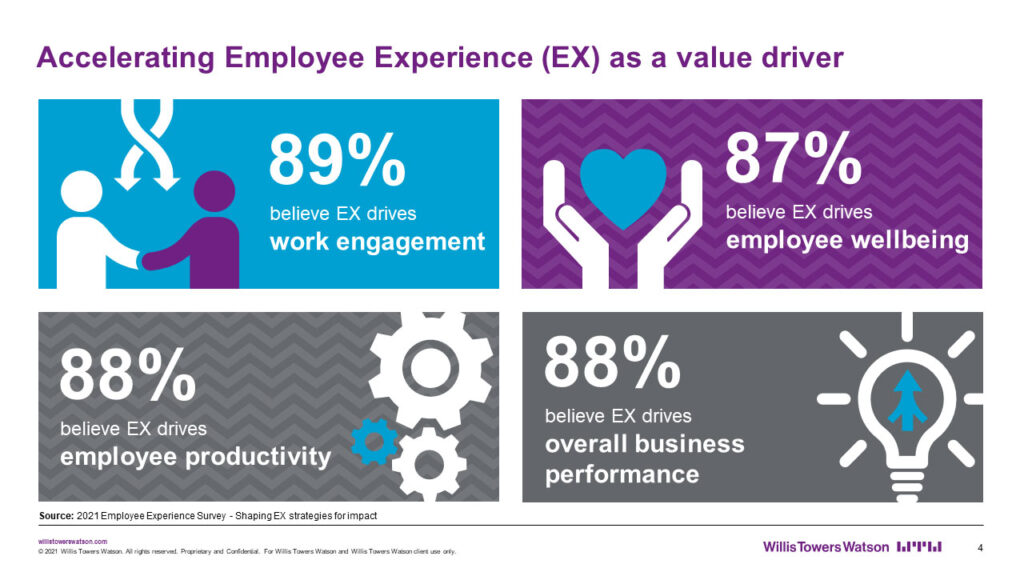For post-COVID win: 95% of PH employers to improve employee experience
by Ralph Hernandez / August 23, 2021
Many employers in the Philippines will be prioritizing enhancing employee experience over the next three years, a survey by Willis Towers Watson (WTW), a global advisory, broking and solutions firm, showed. But as employers acknowledge the need to transition to a hybrid work arrangement due to the pandemic, the survey also found out many are not ready to face the challenge.
95% of the 91 companies consisting of over 480,000 employees surveyed in the 2021 Employee Experience Survey last April said improving the employee experience will be an important priority at their organization. Only 65% indicated that it’s as important prior to the COVID-19 crisis. Most of the respondents also believe a positive employee experience is a key driver of engagement (89%), productivity (88%), overall business performance (88%) and employee well-being (87%).

More than half (52%) reported a negative impact on the employee experience as a result of the pandemic. At the height of the government-imposed lockdown in 2020, many employees took pay cuts and some were laid off. Several companies also downsized their workforce and restructured benefits.
“Whether it’s due to employer actions such as pay reductions and layoffs or because of virtual work and personal hardships for some, the pandemic exposed shortfalls in the employee experience at many organizations. Many employers are not equipped to deal with these challenges,” said Lee Briones, Employee Insights Leader of WTW Philippines.
“Our study reveals that 40% of organizations have undefined or a basic approach to the employee experience that is not aligned to the business strategy. Enhancing the employee experience has therefore become an imperative for organizations and it’s one that will take time,” Briones added.

Rise in unemployment?
Based on the latest data from the government, unemployment rate in the Philippines has improved to 7.7% as of June 2021. This is equivalent to about 3.76 million Filipinos, down from 10% in July 2020 or estimated at 4.6 million people.
But this number would likely go up with the influx of returning overseas Filipino workers due to COVID-19, warned Senate labor committee chairman Joel Villanueva in a radio interview. According to a report by the International Organization for Migration, about 800,000 OFWs were repatriated from the start of the pandemic until December 2020.
And while government agencies have programs in place to assist and reintegrate returning OFWs to the local workforce, Villanueva said from his experience as head of Technical Education and Skills Development Authority that most OFWs reject skills programs. He explained that OFWs are looking to return abroad as soon as possible to sustain their families’ expenses.
Work from home arrangements
While employers work out the adjustments necessary to prioritize employee experience, the WTW survey further identified three key areas: a change in work model, prioritizing wellbeing and aligning total rewards programs to diverse employee needs.
Over eight in 10 employers (87%) acknowledge that the new realities of the labor markets will require a hybrid model for many roles. But only 61% are flexible about where or when work gets done; 70% are in the process of reimagining careers in response to changes in the way work is accomplished; and more than half (61%) are segmenting Total Rewards to account for a different workforce profile–and there will be further challenges ahead.
“As organizations look ahead to a post-pandemic era, their ability to move the needle on the employee experience will be critical. To succeed, they must start with a bold employee experience strategy that supports their business strategy and is based on a consistent model. Then, they can turn to execution–adapting programs and policies reflective of flexible work, paying employees fairly, enhancing benefit delivery and wellbeing programs, supporting workers in a more agile and flexible workspace, and aligning Total Rewards programs to meet the needs of a diverse workforce,” Briones concluded.
Other findings from the survey include:
1) Using digitalization to transform the employee experience fundamentally over the next three years was highlighted as a major focus for a large proportion of organizations (70%).
2) When asked to identify the areas needed to improve employee experience, three quarters (76%) of employers in the Philippines say changing leadership competencies over the next three years is a priority.
3) Developing change capability is also critical as only 42% of organizations find senior leader effectiveness at managing change a major strength.
Read also:
- Cyber attacks, data loss top risks to businesses: global survey
- The White Space that we need
- Well-being strategy, key to talent attraction and rising workplace stress

Image source: Patrick Rillorta | Department of Labor and Employment


